Heaven's Vault
Developer: Inkle
Publisher: Inkle
Platforms: PS4, PC
Price: $24.99
Copy Provided By Publisher
April 16, 2019
Heaven’s Vault is not like any other video game I’ve played, possibly ever in my life, and that makes it both incredibly alluring and incredibly daunting to review. Let it never be said, though, that I don’t try! If it’s novel in some strange, new way, you can bet it’s going to snag me like a fishing hook; whether it then reels me in, and possibly you by association, that’s what we’re here to see.
Imagine a heroine who doesn’t wield weapons. She doesn’t rappel down cliffs, and she doesn’t slay monsters. Yet she’s got attitude and an adventurous spirit. She braves personal harm in less than hospitable environments for her cause. And what is that cause, you’re asking?
The exciting world of archeology.
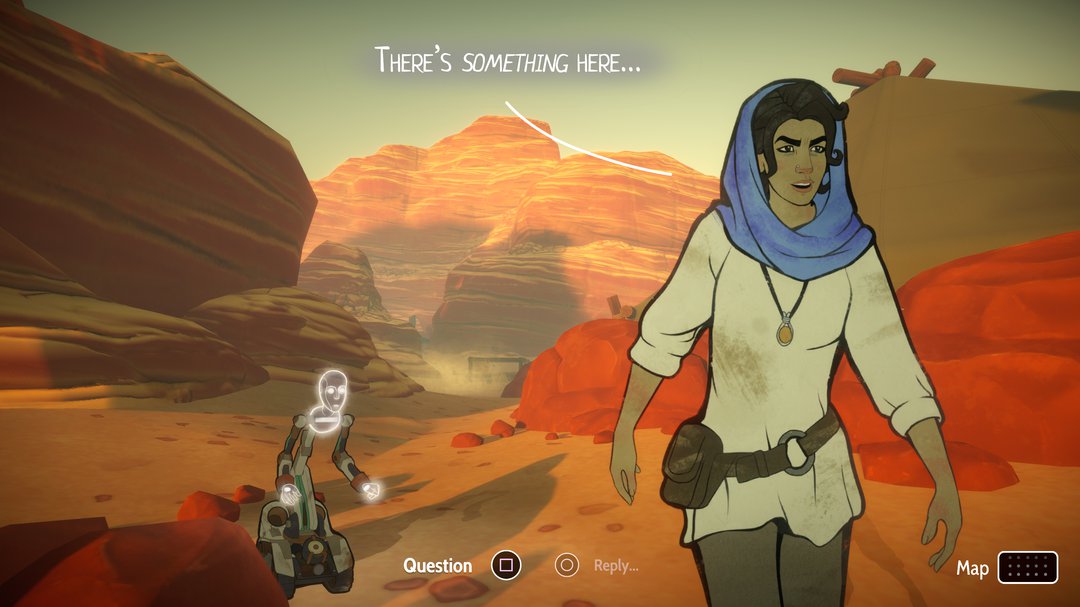
You bet there's something here, and we're going to find it!
A Different Path Of Adventure
Let’s get this out in the open: our protagonist, Aliya Elasra, isn’t Lara Croft, and she’s not a lady Indiana Jones either. She is after artifacts from the past, but she does so at a walking pace, examining long forgotten sites with nothing but the help of her cosmic sailing vessel, her intuition, and her robot companion, Six. Interestingly, whether you play her as a fortune seeker or space scholar is up to you. But I’m getting ahead of myself.
Right from the get-go, everything about this game radiates a sense of how different it is from its hand-drawn art direction to its gameplay. The main mechanic, as well as the story element that drives the narrative, is in deciphering an ancient language. The game frequently fades to a text translation mini-game in which Aliya attempts to use words she knows (or thinks she knows but isn’t sure of yet), as well as the context in which she finds inscriptions, to figure out new words. And in so doing, she pieces together more clues about the locations she visits and the things she finds.
There is a larger plot at work, as well. When the disappearance of a fellow university scholar starts Aliya on a course to retrace his discoveries and hopefully where he disappeared to, the plot quickly grows to something more ominous. Something to which the key to stopping may be locked in the past. And it’s up to you to dig it up.
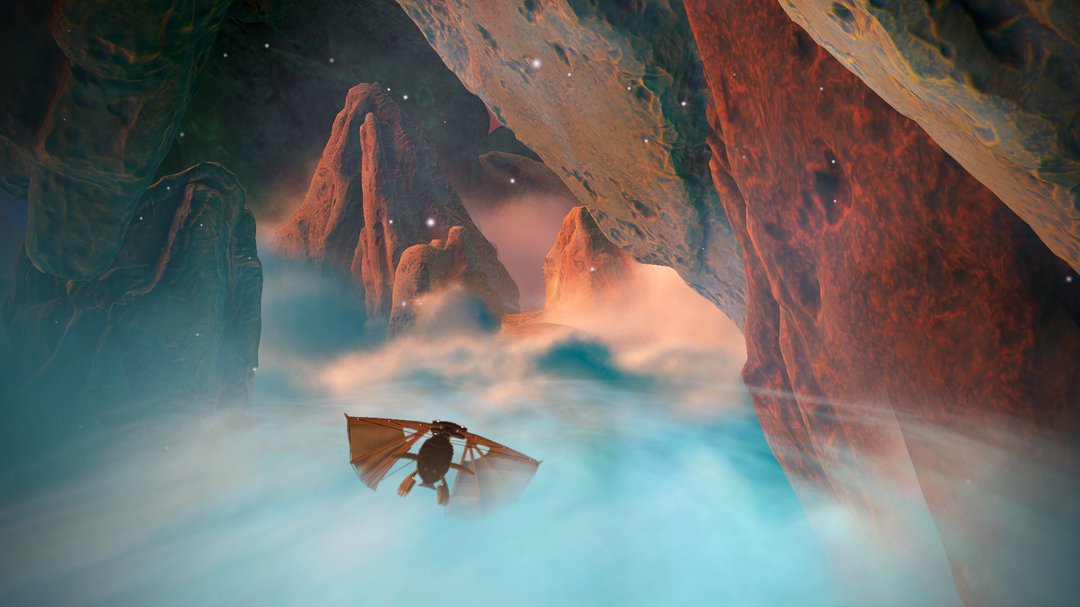
The sailing sections are as relaxing as they are beautiful.
A Story From Another Time
My history with Heaven’s Vault actually goes back two PAX Easts. I have a habit of roaming on the show floor never quite sure of what I’m looking for but knowing it when something catches me out of the corner of an eye. It could be a nostalgic interface, a particular style of graphics, quirky humor, or some kind of uniquely highlighted game mechanic. In the case of Heaven’s Vault it was the graphic novel style animation fading in and out over itself as the protagonist walked in still shots across the screen, a single monitor within Sony’s massive demo area. A closer look revealed a game built around reading a long forgotten language. There were no queues yet. I picked up the controller.
What I experienced in that demo was a remarkable taste. An old building overgrown by plants. An inscription hinting at—a temple? A garden? I took my best guess and moved on, ignoring Six’s protests for my personal safety and hopping a crumbled stone wall to enter the ruin. Aliya mused aloud as to the purpose of the structure as I moved around the area, hunting for any fragments of text still readable on walls, statues, or other loose artifacts. Why was I there? What was I searching for? The demo didn’t last long, but I was left with quite the impression: a strong woman in the starring role, intriguing exploration, clevel logic puzzles in reading the ancient language, all wrapped jaw dropping art and atmospheric, orchestrated music (or occasionally a lack thereof, enhancing the stillness of a place). I politely, enthusiastically asked to be put on the press list for Heaven’s Vault and moved off. I didn’t hear back for nearly two years.
When I did finally receive word the game was releasing, I made sure to clear my projects. Like an artifact from a lost era, I’d nearly forgotten that demo, but in that one email the memories all came flooding back to me.
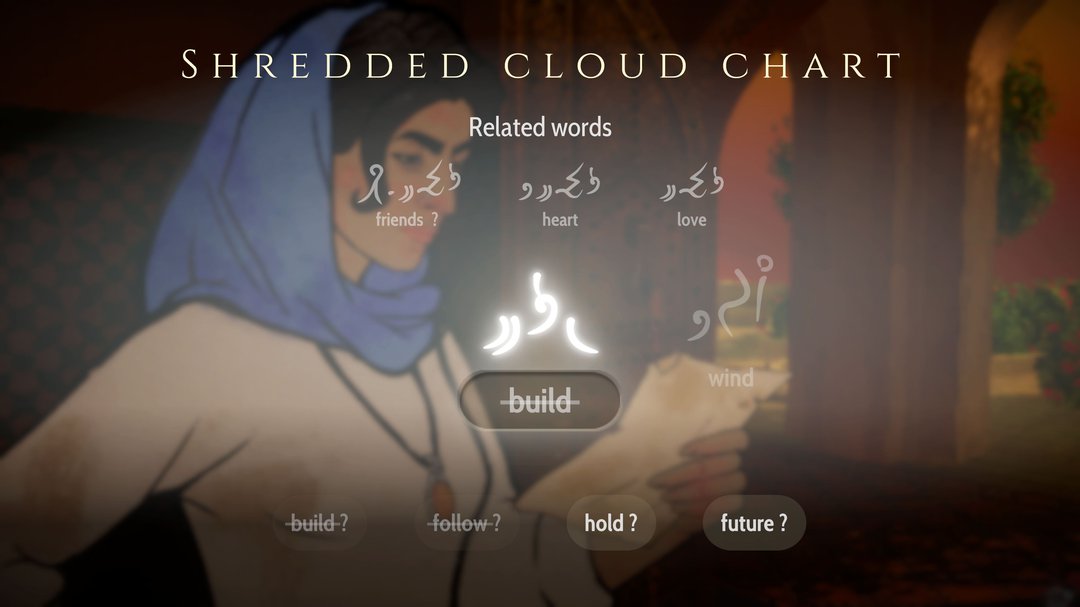
An example of the text translation that drives the game.
Context Is Everything
What’s funny to me in hindsight is the concept of context. When I played that demo, I had no idea how far into the game I was glimpsing. I approached the translations as a person completely guessing based on nothing but the onscreen word suggestions, what some symbols seemed to resemble, and Aliya’s immediate surroundings. That alone was enough to hook me, but it took on a whole new level of meaning as I played the game again at home. As it turns out, that scene was quite a ways into the game, and coming to that point again the game had now trained me to recognize several of the word elements and the types of words they were typically seen in (for example the pictographs for person, travel, and place), an insight I didn’t have on the PAX show floor. I used to be a public school English teacher, and my friends have known me to quote this saying in regards to more than just language: context is everything. This is especially true of English, where we can make word usage standard by “misusing” it for long enough, but the sentiment works well enough for games too.
This was a layer that was previous hidden to me, the idea that one could make better guesses at words based on more than just the context of where they were found. When translating a new word or phrase, the screen had always displayed some related words along the top of the screen, previously encountered combinations of glyphs that might maybe be related, but this was a new level of depth I didn’t realize was incorporated into the game. This insight that took my ancient language skills to the next level was exhilarating! The realization that I could combine “above” with “light” to make “stars” but I could also combine it with “opposite” to make “below” (I should note that these words are my own designations for the symbols, as there are very few actual words formed by single glyphs). Though I will still say that, while I found myself learning more and more of the main concept pictographs, and this was often good enough to infer with, it still took me until practically the writing of this review to recognize how to easily tell nouns from verbs.
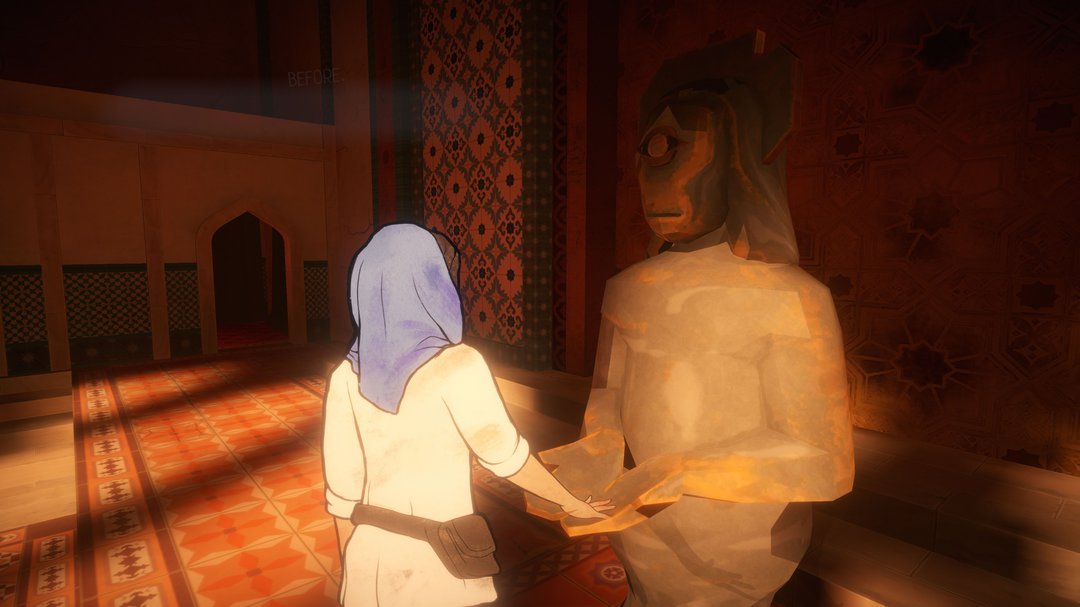
If context is everything, then what is this place, and what are you?
The game is full of these little “aha” moments and is all the richer for them. When you’re complimented by another character on your first translation you might feel as if you’ve made nothing more than a lucky guess. But when you complete your first 4 word phrase, you’ll feel quite clever. When translations start relying on your recognition of how words start and finish in order to properly translate a sentence with no spaces, you will feel like an accomplished scholar. And the first time you panic over a phrase that fills the entire screen, or a word that’s at least 8 characters long, you will feel like a first-year student again. And yet, each time Aliya or Six confirms a word you’re using correctly your confidence grows, and you find yourself eagerly hunting out every scrap of paper, every inscription in stone or bronze, just for a chance to throw your brain at one more phrase. Maybe it will give you an insight into a new, lone scrap of vocabulary. Maybe the next translation will be the one that helps you figure out what that new, nonsensical squiggle means.
That’s not to say that the game ever lets you lock yourself into a wrong translation. On occasion Aliya or Six will state their confidence in a word choice being used correctly, ensuring you’ll never be able to incorrectly swap it to something else, or they will express doubt, signaling you’ve been misusing a word for too long, forcing you to adjust it. At any time, you can pause the game and go into your history of translations or hop back to previous ones through the “related words” above one you’re currently working on, ensuring that you’re never more than a few inputs away from revising your notes. None of these translations seem to prevent you from moving through the story, though Aliya’s interpretations of what she’s learned seem to carry a greater weight as you work together with her towards the escalating plot finale.
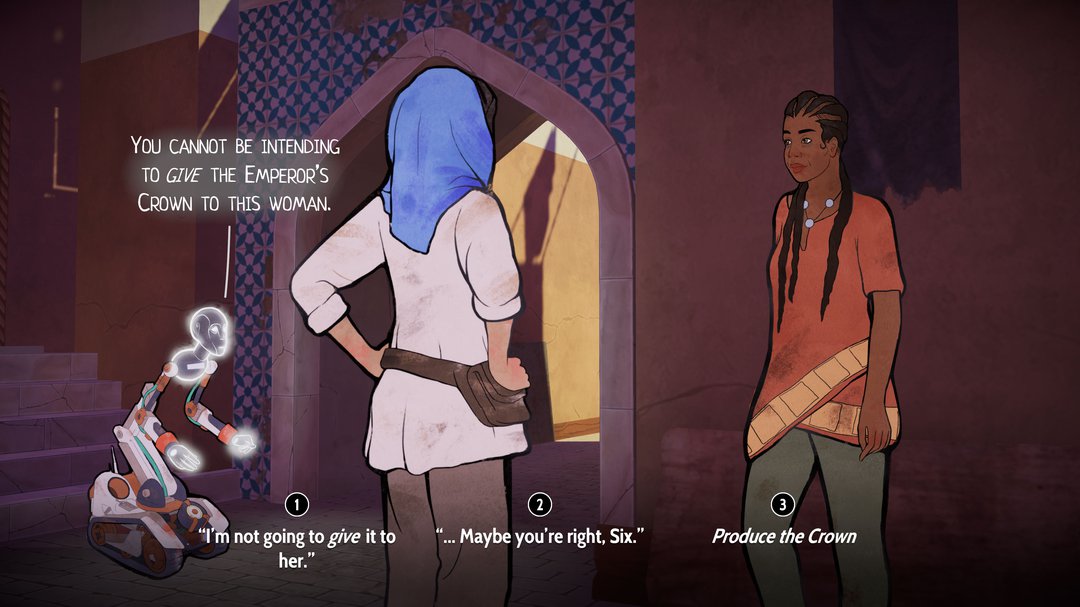
It's not always just you and Six. Sometimes you drop in on old friends.
Sets Its Own Walking Pace
If it seems like I’m intentionally talking around the finer points of Heaven’s Vault, it’s because I am. As with one of the major points from my Overlight review, this game lives on its lore; each level is characterized simply by some combination of walking, reading, and talking to those around you (often just Six, but sometimes you visit settlements). You do occasionally interact with the environments, but only sparingly. As such, and because I’d hate to ruin the fun of translating the ancient language for you, I’m trying my hardest to stay spoiler free here. Unfortunately, outside of the aforementioned atmospheric music and stunning artwork, along with its lush environments and charming ancillary characters, there isn’t much left to discuss aside from the translations that drive the game.
Which brings me to that point at the end of each of my reviews where I mention who this game might not be for. To be honest, if you’ve read up to this point, seen some screenshots, and decided that the lack of action looks incredible dull, then you might do well to steer clear of this title. There is tension in the plot and between characters, but the pace and tone of this game are subtle and subdued. I will reiterate that you walk everywhere; there is no run feature (though areas aren’t too big to frustrate you if you want to backtrack). This is a game that demands you play it at its own pace; while you’re free to rush through each area, you really get the most out of this game by taking the time to be the explorer that Aliya is at heart. Interaction points are clearly indicated on screen, but if you don’t take the time to walk through the environments, you’ll miss handfuls of opportunities to buff out your vocabulary.
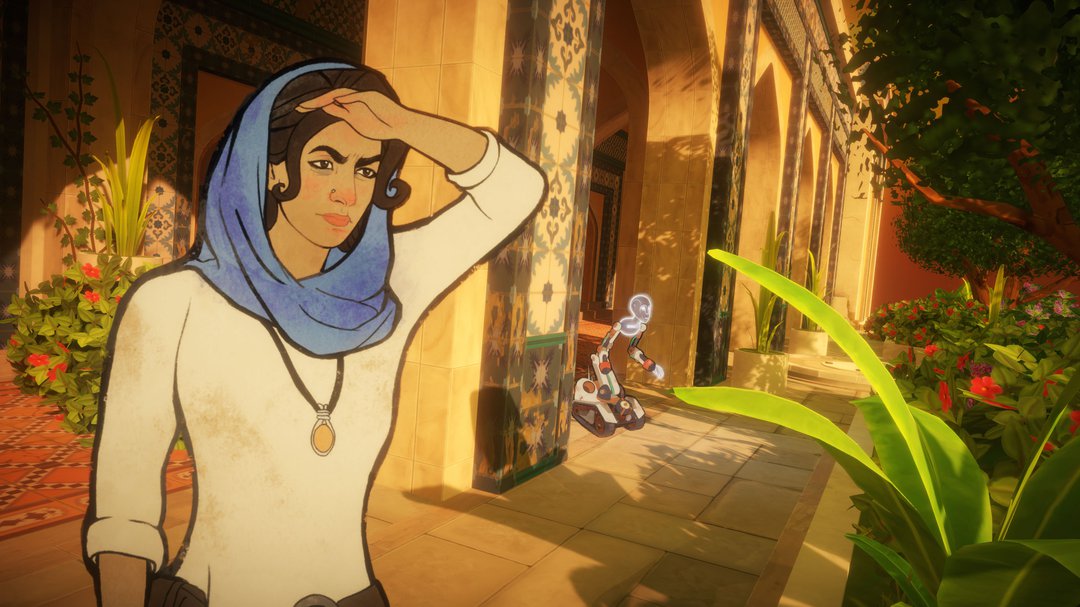
Can you just take your time to take it in?
This is the kind of game best enjoyed with a relaxing cup of hot tea in the evening. Savor the intrigue, revel in the mystery. For some, the idea of there being no run button, that the entire game is at the speed of Aliya walking, might be a terrifying thought. In a way, it reminds me a lot of a recent triple-A title that was also criticized for being slow and forcing the player to play at its own pace: Red Dead Redemption 2. It was also a game I found that was best enjoyed if you let yourself get lost in its world and worried less about a fast travelling everywhere; and in the places such things really count, Heaven’s Vault does include fast travel to locations you’ve already visited, though you’ll need to fly new routes manually the first time. If you can’t stop to smell the flowers while Aliya copies the latest inscription into her journal, this probably isn’t the game for you.
There’s also the concern that the game progressively saves as you play. Like an ironman mode, there is no reloading your game if you botch a particular dialogue or exploration section. This will result in you missing things your first time through the game, and whether you have the patience to sit through an entire second playthrough is up to you (knowing that if you miss something accidentally again you’re out of luck). I’ve become more than a little frustrated at certain side areas of the game knowing that I could have done them better but being 12+ hours into the game and unwilling to start everything over. Your mileage may vary, so you’d do well to visualize your future self messing up a section and seeing how it makes you feel. This didn’t break the experience for me, and I’m still eager to see how the main story ends, but it’s certainly a concern.
Finally, a small note, but sometimes it can be tough to gauge how a particular dialogue option will actually play out when you select it. Many times what I thought would be a simple statement came off as brash and overly aggressive, putting off the person I was talking to. It’s a minor concern overall if you just remember that the choices on the Square button are friendly while Circle typically leans more aggressive (the X button, being between the two on the controller naturally gravitates to neutral responses).
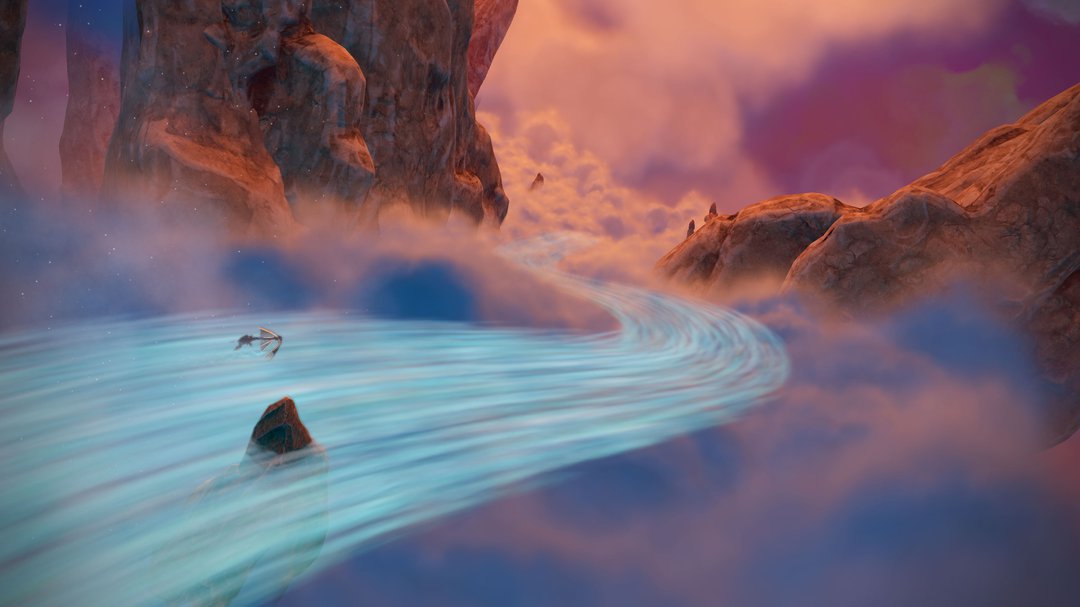
That being said, if you’re still at least a little curious reading through all those concerns, I think you’ll do just fine giving Heaven’s Vault a try. Curiosity is the right state of mind to approach this title with. There’s plenty on offer in terms of character, story, and total hours of gameplay. The lore is rich and the world feels like the characters have lived in it for much longer than the span of me picking up a controller. This fresh take on the adventure game genre is something I haven’t really seen before, so if you consider yourself either a fan of old adventure games or are just looking for something interesting and different, you should pick this game up. I guarantee you’ve never played anything quite like it and you’ll be glad you did.